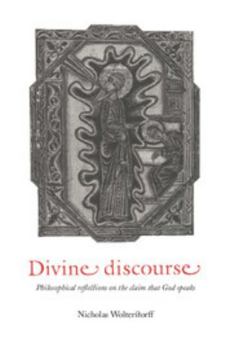Divine Discourse: Philosophical Reflections on the Claim That God Speaks
Select Format
Select Condition 
Book Overview
Prominent in the canonical texts and traditions of Judaism, Christianity, and Islam is the claim that God speaks. Nicholas Wolterstorff argues that contemporary speech-action theory, when appropriately expanded, offers us a fascinating way of interpreting this claim and showing its intelligibility. He develops an innovative theory of double-hermeneutics - along the way opposing the current near-consensus led by Ricoeur and Derrida that there is something wrong-headed about interpreting a text to find out what its author said. Wolterstorff argues that at least some of us are entitled to believe that God has spoken. Philosophers have never before, in any sustained fashion, reflected on these matters, mainly because they have mistakenly treated speech as revelation.
Format:Paperback
Language:English
ISBN:0521475570
ISBN13:9780521475570
Release Date:October 1995
Publisher:Cambridge University Press
Length:340 Pages
Weight:1.25 lbs.
Dimensions:0.7" x 6.0" x 9.0"
Customer Reviews
2 ratings
A seminal work of philosophical theology
Published by Thriftbooks.com User , 18 years ago
Wolterstorff delivers a carefully argued defense of the claim that God speaks today. This book would be an interesting read for those who might doubt whether God does indeed actively interact with humans today. However, the seeker might be frustrated by the fact that the argument is based upon the assumption that God does indeed exist. Overall, the precise argumentation and the unusual subject make this book a real gem.
A thoughtful mix of philosophy and devotion
Published by Thriftbooks.com User , 24 years ago
Divine Discourse is a philosophical and theological treat. It offers a philosophical exploration of the devotional reading of scripture. In so doing, it unveils the conceptual, epistemic and interpretive obstacles that one faces if one believes that God spoke and perhaps continues to speak through sacred texts. Like most of Professor Wolterstorff's books, it is a first word rather than a final word on a thought provoking topic. It begins a conversation and encourages further discussion. In Divine Discourse, Wolterstorff takes up three important philosophical topics, viz., divine revelation, philosophy of language and hermeneutics. The opening argument of the book is that the Bible should be understood under the rubric of divine speech, rather than divine revelation. This argument is followed by an analysis of divine speech in light of the speech-act theory of John Austin and John Searle. Such an analysis attaches significant weight to the role of the speaker or author in fixing the meaning of a speech-act or text. Since this is not an uncontroversial position in contemporary philosophical discussions of interpretation, Wolterstorff devotes a couple of chapters to answering criticisms from two of his more important critics, Paul Ricouer and Jacques Derrida. The remainder of the book takes up a variety of interesting hermeneutic and theological issues that arise from the fact that the Bible is both a divine and a human product. I would recommend this book on the strength of the opening discussion of Augustine's conversion experience alone. For anyone interested in the philosophical and theological issues surrounding the nature and interpretation of the Bible, this book is worth a careful read. For anyone interested in the impact of philosophy of language on hermeneutics, Divine Discourse provides important food for thought. And for anyone who is weary of the traditional disciplinary lines separating theology from philosophy, hermeneutics from the philosophy of language, or Anglo-American from contemporary European philosophy, this book will provide a welcome and refreshing change.





